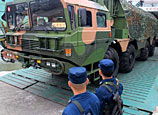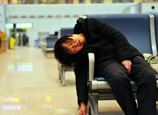
When Irish writer James Joyce published his last novel, "Finnegans Wake," in 1939, he claimed the book would only be understood by readers 300 years later. He could never have expected the mania for his book among Chinese readers in 2013.
The Chinese-language version of the first volume of Joyce's masterpiece, translated by Dai Congrong, a professor from Shanghai-based Fudan University, after eight years of hard work, sold out within three weeks of its unveiling last month - quite an achievement for a Western novel in China, let along one that is infamously hard to understand.
"It is totally unexpected!" said Wang Weisong, editor in chief of the Shanghai People's Publishing House, the publisher of this new edition. He said the popularity of such a book reflects today's cultural landscape in China.
Finnegans Wake is reputed as one of the most difficult works of fiction in English for its experimental style and unique polyglot language composed of composite words from 60-70 world tongues. It has been noted that Joyce didn't intend it for the general reader.
"The work occupies a preeminent place in English literature despite its difficult language and structure, so Chinese readers, whether they can understand it or not, are willing to buy a copy and have a try," said Chen Xin, president of the Shanghai Century Publishing Group, one of China's major publishers.
The popularity of the novel could not be called a victory for literature, but a result of aroused public curiosity during the Internet age, he adds.
Actually, Joyce's novels had already achieved a high profile with Chinese readers. During the 1980s and 1990s, Western literature icons such as Joyce, Gabriel Garcia Marquez and Marcel Proust inspired young literature fans when their works were translated and introduced into China.
Over 1,000 readers waited in line to buy Joyce's "Ulysses" in Shanghai bookstores in 1995 and all the copies sold out on the spot, recalled Li Jingrui, founder of Yilin, China's flagship magazine of foreign literature.
Eighteen years later, the China success of another Joyce masterpiece has made the promotional efforts of Shanghai People's Publishing House worthwhile.
People may have noticed huge outdoor billboards advertising the novel in major Chinese cities such as Beijing, Shanghai, Guangzhou and Chongqing. "Finnegans Wake" is the first book to be promoted in this way.
Workshops inviting some of China's famous writers to discuss the work have been held by the publishing house in Beijing and Shanghai. At one event, Jiang Xiaoyuan, a professor at Shanghai Jiao Tong University said, "Joyce must have been mentally ill to create such a novel!"
Wang Anyi, another renowned Chinese author, admited it would have been hard to persuade herself to read the book if it were not for her great confidence in Irish literature.
The best seller also created a huge buzz on the Internet. "'Finnegans Wake' is a book for bibliophiles, for critics but not for readers," "Eudaimonus" wrote on Sina weibo, China's Twitter, adding that it is impossible to read and understand the novel.
Some weibo users said that anyone who claims to love literature must read it.
But there has also been much online discussion on the reasons behind the popularity of the hard-to-understand text. Is it just out of pure curiosity or real interest in literature itself?
"Luozhiqiu," a weibo user verified as an English teacher at Nanjing University, questioned the publisher's marketing approach. He said excessive marketing is tantamount to fooling readers into buying a complex work they cannot understand. Only a very small minority of readers in any country are interested, he said, adding that they will buy the work on their own, without any marketing to encourage them.
















 A Taiwan student's adventure in Beijing
A Taiwan student's adventure in Beijing


![]()
